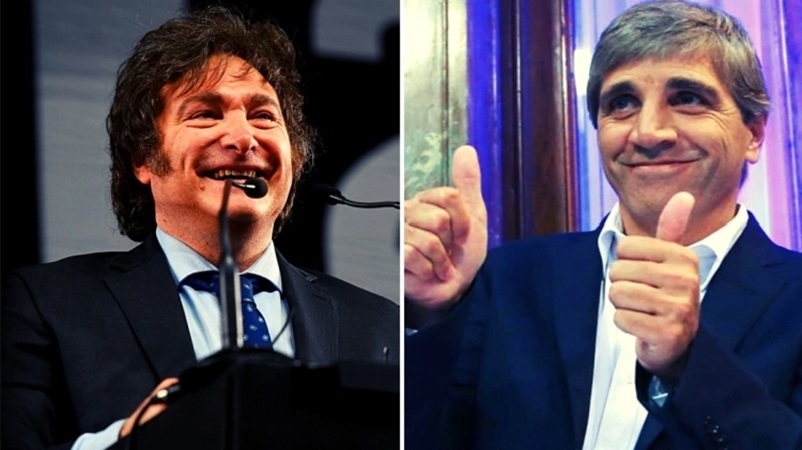
Luis Caputo was an employee of JP Morgan, Deutsche Bank and the World Bank, so it is not a surprise that he knows how to benefit large capital and international speculators. Just as he indebted the country in favor of the vulture funds under Macri’s management, at a speed rarely seen before, he is now achieving millionaire profits for the owners of Argentina’s debt bonds. But the financial catastrophe of 2019 could be repeated with the contradictions that the Government is accumulating, despite the celebration of the markets.
Let’s look at the central elements that the ruling party marks as successes in recent weeks:
- Rise in debt bonds and low country risk: Argentina’s Global bonds gained an average of 2.2% on Wall Street this Monday, to reach new high prices since their release on the market four years ago. The average price was US$62.40. The country risk, measured by JP Morgan, cut 53 units to stand at 914 basis points, a minimum figure since August 9, 2019 (860 points). The index indicates the surcharge that the State must pay to get into debt, which depends on the risk that large capitalists consider the country has of not being able to pay its debts (default).
- Stocks rise: The Buenos Aires stock market, the Merval, accumulated a gain of 9.1% in pesos and 17.5% in dollars in October. Although the economy is in recession and salaries are far from recovering what they lost at the beginning of the year due to the Caputo devaluation, a group of concentrated companies are multiplying their profits (driving up shares).
- Lower inflation: at the cost of destroying the consumption of the vast majority, multiplying poverty and destitution, and sinking production, the Government managed to raise prices by only 3.5% in September. A very high value compared to the rest of the world, but which businessmen see as a sign that inflation will continue to fall.
- Money laundering: The Government is allowing dollars from tax evasion or illegal activities to be deposited in banks without paying a single dollar or at very low rates. Since Javier Milei took office, dollar deposits have grown by US$17.1 billion, totaling US$31,200. Part of these deposits go to the Central Bank (BCRA) as reserve requirements, increasing reserves. The first stage of laundering ends with the month of October and beneficiaries have a wide menu of options to withdraw dollars from banks from that date.
- External debt: The Inter-American Development Bank (IDB) and the World Bank recently announced loans totaling US$8.8 billion. This, added to the IMF’s praise for the Government, in Caputo’s last trip to Washington, is interpreted by the investment funds as an approval from international organizations, which would not let Milei go, leaving him without financing. However, in 2024 more than US$20 billion will mature, a figure that is not easy to face, and the elections in the United States on November 5 could alter the panorama.
Is winter coming?
The Government’s plan is supported on fragile legs, in addition to the contradictions already marked, as can be seen in the following elements:
- Artificial dollar: Caputo is supporting the price of the currency based on the exchange rate that prevents free purchase, the intervention of parallel quotes through the allocation of 20% of exports in cash with liquidation and direct intervention in parallel markets when it so happens. they consider necessary. The current exchange rate makes Argentina expensive in dollars, making the functioning of large sectors of the economy, such as a large part of the industry, unsustainable. Furthermore, once the money laundering is over, with the BCRA’s reserves still in negative territory and without defined financing sources, it is not clear how they will continue to sustain the appreciation of the peso in the future.
- Weak trade balance: More dollars are entering the country due to the exchange of products than are leaving it due to the collapse of imports as a result of the recession. Either the decline in the economy continues to further damage production or imports will begin to partially recover, exacerbating the shortage of foreign currency.
- Over-indebtedness: The State ended 2023 with a stock of debt equivalent to almost 90% of GDP (Gross Domestic Product), when in 2011 it had reached 40%. To continue growing the debt, as Caputo intends, is to bring it to the levels that triggered serious debt crises in the past.
- Lack of investments: While speculators earn millions by buying bonds and a few large companies raising prices above salaries, there are almost no investment plans outside of limited extractive projects for natural common goods. Questioning the possibilities of growth of the economy and the income of dollars.
- capital flight: With these conditions, after the Government lifts the exchange rate, nothing can prevent large businessmen from carrying out a mass capital flight as they did at the end of Mauricio Macri’s administration if they consider it convenient.
Without ruling out any of these elements, it is important to highlight that Milei’s plan has as its cornerstone the “zero deficit”, that is, the adjustment of the national budget to pay the fraudulent external debt. Students, health workers and retirees are showing signs of exhaustion with the attacks they are suffering. This week there will be national transport strikes, despite the limitations imposed by union bureaucracies. If the Government’s plan does not explode on its own, or together with its crisis, it may be the struggle in universities, workplaces and the streets that forces Milei, Caputo and the IMF to no longer be able to apply their neoliberal recipes.
Source: www.laizquierdadiario.com

